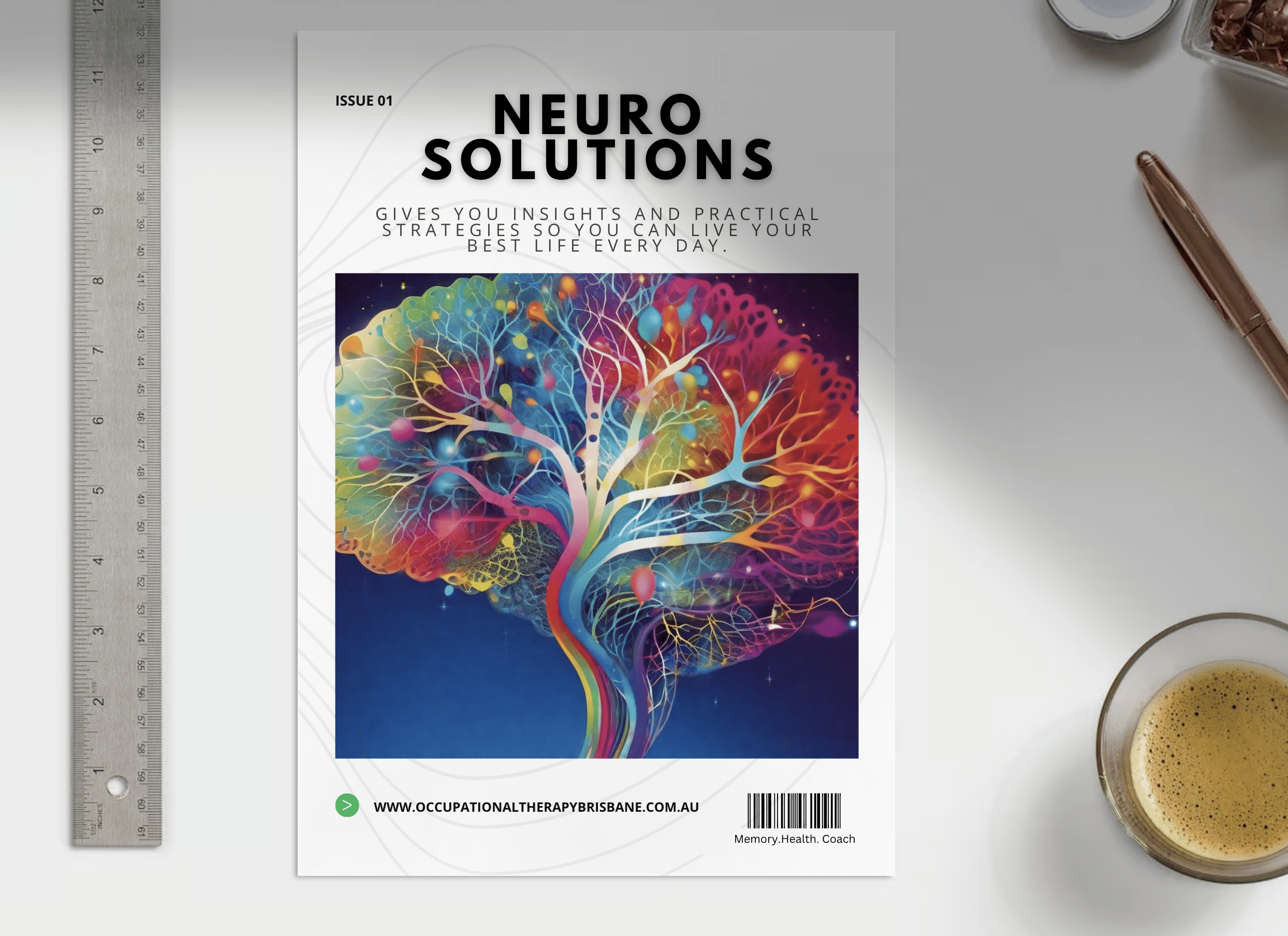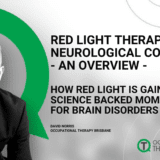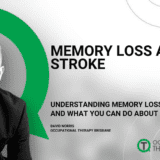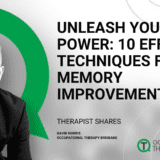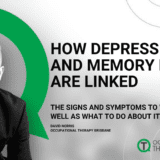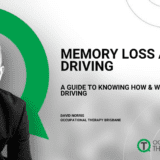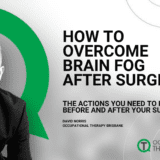Temporary memory loss or amnesia is a common condition that affects hundreds of thousands of Australians each year. The symptoms can include short episodes of forgetting things, having trouble remembering names and dates, and even feeling confused.
These are common everyday experiences, right?
The issue for many people, maybe like you, is understanding when is temporary memory loss normal and when isn’t it?
If this is sounding all too familiar, you’re in the right place as
- We’ll dispel what is normal memory changes and what isn’t
- What can you do about temporary memory loss
- And importantly, check the common health and life factors you may have missed that’s making it hard for your memory to work at it’s best
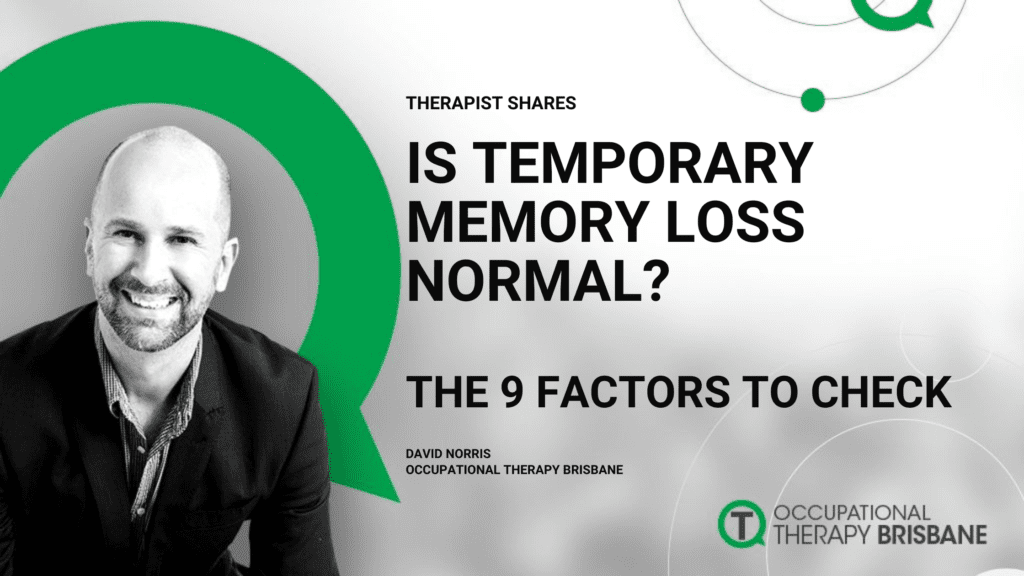
It’s clearly front of mind for many people, maybe like you, “Is this my memory ok or do I need to get it checked with a memory loss assessment?”
If you’re worried about your memory and looking for practical help the Memory Health Hub maybe what you’re looking for. Get in touch today to see if we can help.
What’s the difference between short term Memory Loss and Temporary Memory Loss
Let’s clear up a few things first so that we are come from the same home sheet.
Short-term memory refers to the ability of your brain to store information you’ve just taken in. People living with specific forms of dementia will experience loss of memory especially seen as poor short term memory performance. No doubt this can impact your daily life in many ways.
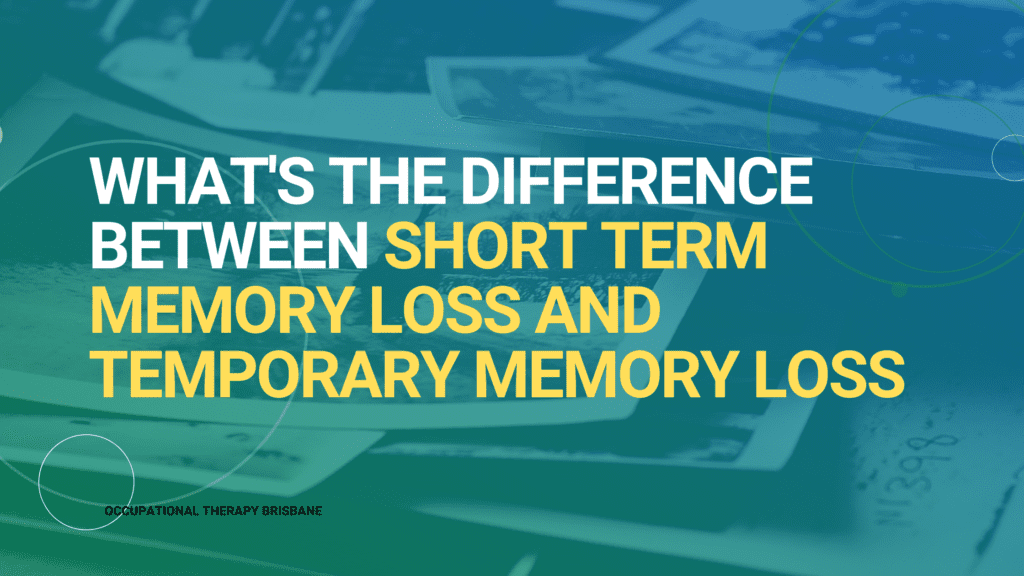 Where temporary memory loss occurs when someone has difficulty remembering recent events and is contained to a period of time. This type of memory loss is temporary and usually goes away within days or weeks or months. It may include experiences of long term memory, short term memory as well as context related memory or episodic memory changes – Yes, there are so many different features of memory! But… and here’s the kicker with “temporary memory Loss” it’s limited to a short period of time. Cohen’s (2008) chapter on the difference of memory loss is for bedtime reading ( or a door stop) if you’d like a scholastic introduction to this subject.
Where temporary memory loss occurs when someone has difficulty remembering recent events and is contained to a period of time. This type of memory loss is temporary and usually goes away within days or weeks or months. It may include experiences of long term memory, short term memory as well as context related memory or episodic memory changes – Yes, there are so many different features of memory! But… and here’s the kicker with “temporary memory Loss” it’s limited to a short period of time. Cohen’s (2008) chapter on the difference of memory loss is for bedtime reading ( or a door stop) if you’d like a scholastic introduction to this subject. Is temporary memory loss normal?
It’s ok to forget things occasionally. You know “where did I put those glasses??” Sure, certain health events can cause temporary memory loss.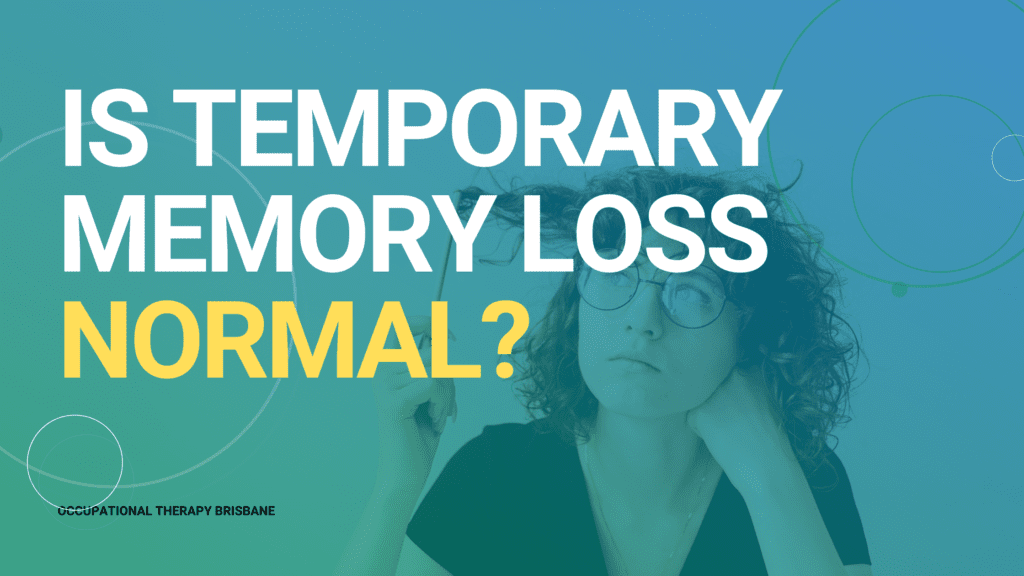 It’s common after a concussion, for example. The symptoms usually go away within a week, although some people may experience them for months. If you think you’ve had a concussion, and are experiencing ongoing memory loss issues please consult you local doctor or consider scheduling a memory loss assessment at the memory health clinic.
It’s common after a concussion, for example. The symptoms usually go away within a week, although some people may experience them for months. If you think you’ve had a concussion, and are experiencing ongoing memory loss issues please consult you local doctor or consider scheduling a memory loss assessment at the memory health clinic. 8 Signs of Temporary Memory Loss
You might be wondering whether or not you’re experiencing memory problems. Are you noticing changes in your memory or experience difficulty remembering things?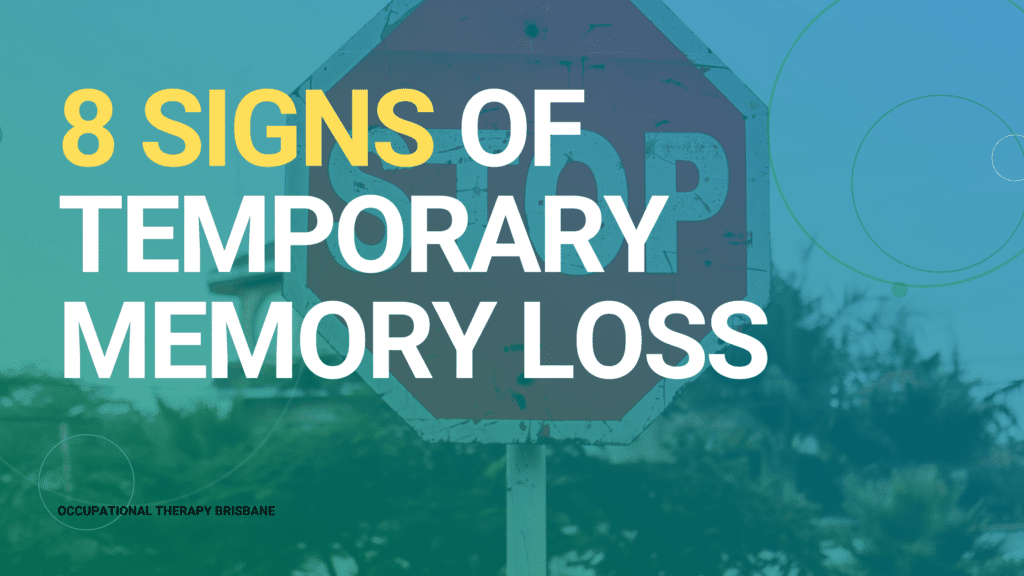 Here’s how memory health changes can appear in your life.
Here’s how memory health changes can appear in your life. - Forgetting people’s names and or faces
- Forgetting conversations and conversation details
- Being more irritable, as your not able to do things as efficiently or effectively as you normally would
- Getting stuck or lost in the middle of a task
- Ending up in a room where you’ve asked “ What Am I Doing In Here?”
- Fogginess or overall mental lethargy which impacts on your attention and ability to recall events clearly.
- Reading a passage of print and not being able to recall the content
- Getting stuck with phone number dictation “ 07 386 … Or was it 07 376…?”
What is it called when you temporarily lose your Memory?
Terms you may hear related to temporary memory loss can vary and this is where the confusion can set in.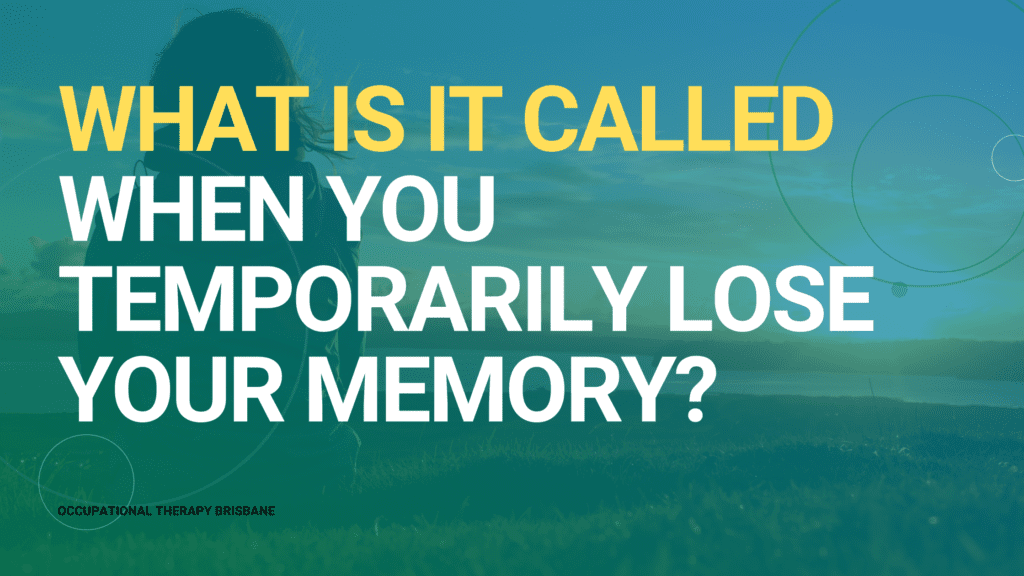 So to help out here’s some common ones
So to help out here’s some common ones - Amnesia: describes a deficit, loss, decline or inability to recall information (memories).
- Transient Global Amnesia: meaning an “episodic memory loss” and probably is the closest fit to temporary memory loss
- Post Traumatic Amnesia or PTA: This is a stage of recovery after a traumatic brain injury when a person has reduced recollection of events after an injury.
- Anterograde amnesia: Is where you can’t form new memories after an event like a seizure or mini stroke but you’re able to recall information before the event.
- Retrograde amnesia: is where you can’t recall information that you made as memories before an event like surgery or a stroke.
Is Temporary Memory Loss a Disease?
Yes, in some cases temporary memory loss is considered a disease. The symptoms include episodic periods where you experiences difficulty remembering things, forgetting what you just read, and having trouble finding words. This condition is commonly referred to as amnesia. There are two types of memory issues associated with amnesia: short term and long term.- Short term amnesia usually occurs after a head injury or brain trauma from a stroke or surgery, seizure, and drug overdose for example.
- Long term amnesia may be caused by Alzheimer’s disease, brain tumors, or other diseases.
What are the common symptoms of Transient Global Amnesia?
Transient Global Amnesia (TGA) is an episodic memory disorder characterized by a loss of recent memory lasting less than 24 hours to many days/weeks. First described in 1956 and since then epilepsy, transient ischaemic attacks (TIA where the blood flow to the brain is reduced temporarily), migraines, venous congestion, heart health (blood pressure) and stress have been associated with its onset (Harrison et al, 2007). People usually experience a period of confusion and disorientation followed by gradual recovery. The condition is often misdiagnosed as a sign of dementia, Alzheimer’s disease or vascular dementia.- Symptoms may include problems remembering events and conversations, difficulty finding words, repeating questions, forgetting names, and losing track of time.
Who Is Likely To Have Transient Global Amnesia (TGA)?
This condition often affects commonly older adults. TGA usually occurs during the seventh decade of life according to Portaro and colleagues (2018).Do memory problems always mean Alzheimer’s Disease? Is it a sign of Dementia?
Memory loss isn’t always a problem. Yes, memory changes are common among older adults – it’s normal. They’re observed as age related changes. However, in some cases it may be a sign of dementia.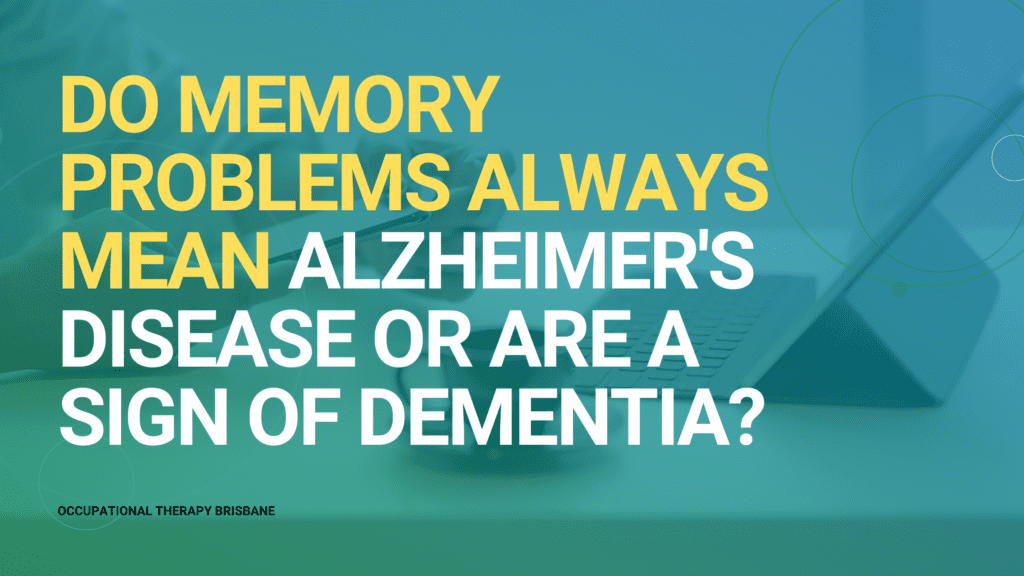
Alzheimer’s disease is a progressive brain disorder that affects memory, thinking skills, behavior, and ability to carry out daily tasks. The most common symptom of Alzheimer’s disease is forgetfulness. But there are many other symptoms, including confusion, trouble speaking and understanding speech, mood swings, aggression, depression, anxiety, and hallucinations. In a previous post we covered “What’s the difference between Alzheimer’s Vs Dementia?” and suggest reading this if you’re after more information. If your memory seems to be getting worse, where it’s affecting your quality of life and are concerned it’s a type of dementia, talk to your doctor. He or she will check your medical health and review your medical history. The goal here is to screen out your medical conditions that may impact your memory. You can also expect your doctor to investigate other factors, such as
- Sleep deprivation or sleep apnoea
- Check your metabolism ( blood sugar levels)
- Rule out infections
- Check you mood
- Do a review of your hormone
- See how you’re abilities are to do daily activities.
- Basically, to get a picture of what could be affecting your memory and may refer you to a memory clinic.
This is where you’ll likely to a cognitive test to check your memory and thinking strengths and weaknesses. But, what’s missed for most is getting a targeted program to protect, sustain and improve it your cognitive health. Sadly, too many people believe they can’t do anything about it and that’s not what the evidence suggest. When looking at overcoming memory loss a multipronged approach like Poseidon’s trident is needed to reduce your risk for memory loss. If all you take away here is.. If in doubt, get it checked out – that’s our advice.
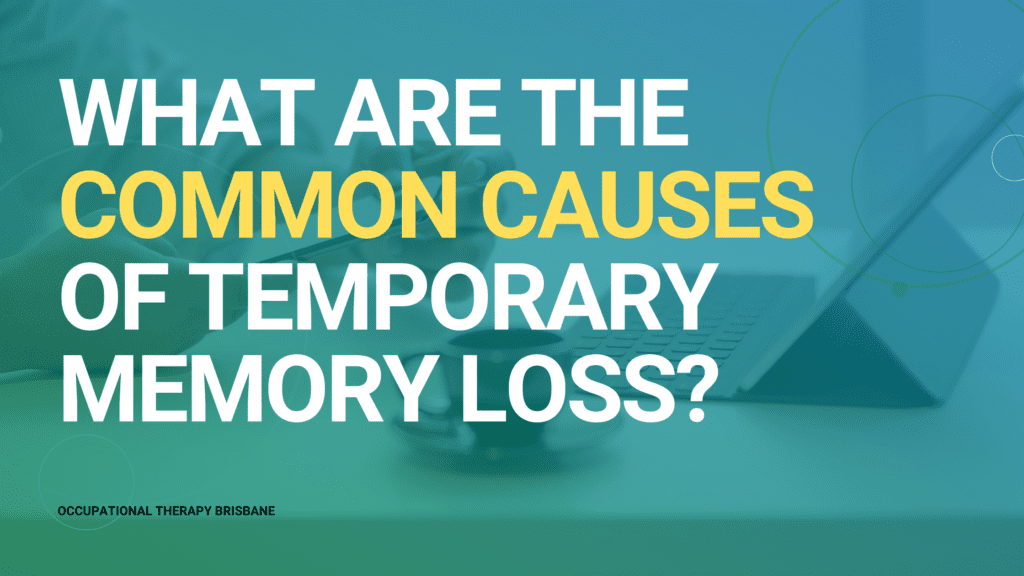
What are the common causes of Temporary Memory Loss?
No doubt memory loss is more common in older people. We’ve touched on several disease processes including Alzheimer’s disease and dementia. But there are other temporary causes that you may not have considered that are reversible.Here are some of the most common causes of temporary memory loss and what can be done to prevent it.Is My Memory Loss Reversible? 9 Causes of Temporary Memory Loss
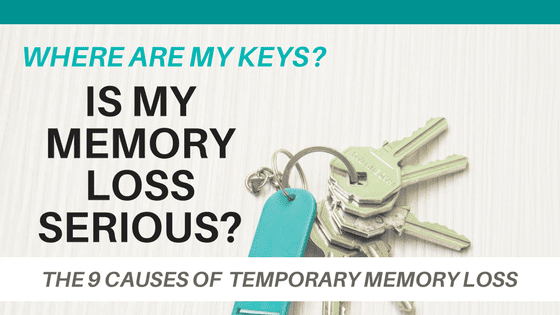
1. Medications
There are many classes of prescriptions medications and over the counter medications which can affect your memory.
- Medications which affect your acetylcholine levels will likely have an impact on your memory performance. Those which lower the acetylcholine levels are observed to increase forgetfulness, reduce your concentration and you’ll likely experience symptoms like “foggy brain”, blurred vision and may mimic symptoms like dementia.
- Others drugs to be mindful of include: sleeping medication, cholesterol lowering drugs, anti-hypertensives ( beta blockers), anti-anxiety medications ( benzodiazepines), pain management medications, anti-psychotic medications ( AARP, 2015)
If you’re taking multiple medications and are concerned about it’s possible impact on your memory, please speak with your doctor or pharmacist to see if there is any possible effects
2. Nutrition- lack or deficiency
Simply, what you eat directly affects the structure and function of your brain and, ultimately, your memory health performance.
- 95% of serotonin, your “happy” neurotransmitter is derived from your gastrointestinal system. (Sarris, 2015).
- Hungry brain: Your brain requires a significant amount of energy, over 20% calories available in your diet will go towards your brain’s performance.
- The right “fuel” will help your brain do the job it needs to do.
- Fats, Proteins and Carbohydrates are all needed in the brain for it to perform at its optimum and absence of certain fats, proteins and amino acids can have an affect on your memory performance.
Vitamin B12 is important for brain health. It helps your body use energy efficiently from food, and it helps protect nerve cells so you can remember what you’ve learned.
A deficiency in vitamin B12 can cause problems with your memory. Too little vitamin B12 in the diet can also affect your mood. People with depression may need extra help getting enough vitamin B12. Ask your doctor or health professional or health care provider if you think you need a vitamin B12 supplement.
- Vitamin B-12 helps maintain healthy nerve cells and red blood cells. A vitamin B-12 deficiency , common in older adults, may contribute to memory problems (Harvard, 2013).
- A large study showed the relationship of poor diet and depression and a recent paper explored the role of diet and neuro-plasticity ( brain change) (Jacka et al, 2015)
Previously we wrote about the role of the MIND diet and reducing your risk for Alzheimer’s Disease.
3. Alcohol and Smoking
Alcohol affects your brain differently depending on how much you drink. Alcohol can cause temporary memory loss, but if you drink enough, you might also experience long-term memory problems.
- Long term alcohol use has been associated with memory loss (NIH, 2004). Blurred vision, reduced balance, slurred speech slowed reaction times and impaired memory are clear evidence of how alcohol affects the brain. A number of factors influence the effect of alcohol such as
- how much and how often a person drinks;
- the age at which he or she first began drinking, and how long he or she has been drinking;
- the person’s age, level of education, gender, genetic background, and family history of alcoholism;
- whether he or she is at risk as a result of prenatal alcohol exposure; and
- his or her general health status. (NIH, 2004)
- Smoking reduces the blood supply to your brain and affects the health of your arteries ( the blood delivery system) to your brain. Heavy smoking is associated with cognitive impairment and cognitive decline in middle age ( Campos et al, 2017)
- Long term alcohol use has been associated with memory loss (NIH, 2004). Blurred vision, reduced balance, slurred speech slowed reaction times and impaired memory are clear evidence of how alcohol affects the brain. A number of factors influence the effect of alcohol such as
4. Lack of Sleep
- Sleep quality and quantity have associated with memory performance changes. Lack of sleep, a poor sleep can affect fatigue which directly impacts your memory performance especially working memory.
5. Depression and Temporary Memory Loss
You can’t always think clearly when you’re depressed and neuroscience has shown the link between the mental health disorder of depression and memory health.
Your thoughts can seem like a jumble of random ideas and feelings. You might lose interest in things you once loved. You might also forget important details about yourself and others
- Experiencing depression can affect your ability to pay attention, focus to experience pleasure with the tasks at hand. Depression is associated with short-term memory loss ( Shelton and Kirwan, 2013)
- We recall better when a task is emotionally underlined or emphasized. Depression no doubt can reduce your positive experience of the world.Talk to someone if you need help dealing with depression. Exercise, nutrition, antidepressants, psychotherapy and neurotherapy maybe of help and worth discussing with you doctor or therapist.
- Experiencing depression can affect your ability to pay attention, focus to experience pleasure with the tasks at hand. Depression is associated with short-term memory loss ( Shelton and Kirwan, 2013)
6. Memory Loss Related to Emotional Problems: Sudden Memory Loss Due To Stress
Too much on your to do list? Are you distracted or busy? Stress and anxiety can also be a snag in your concentration performance. Being in an elevated, tense or hyper-vigilant state can contribute to a sense of being distracted and your ability to remember can suffer.
- Stress Hormones: The stress hormone cortisol is released in large amounts during times of anxiety. Cortisol affects the brain and is associated with memory loss. These memory problems aren’t considered to be permanent or represent any type of loss of brain function ( Lupien et al, 2005).
- Stress caused by an emotional trauma can also lead to memory loss.
If you notice your emotions causing trouble, talk to your doctor about getting treatment. You might need to talk to a counselor or therapist. Learning new activities can help ease emotional problems or more targeted programs like neurotherapy may also be an option.
7. Infection
- Whether it’s the common cold or a urinary tract infection, an infection can impact on your memory performance.
8. Hormone Changes
Thyroid Problems
Your thyroid gland produces hormones that help regulate metabolism. When your thyroid doesn’t produce enough hormones — called hypothyroidism — your body slows down. You may feel tired, depressed, forgetful, and have trouble thinking clearly. A blood test can show if you have hypothyroidism.
- An under- active thyroid gland may contribute to a reduction in mood, energy and mental arousal which can adds up to less ability to recall information.
- An underactive thyroid gland (hypothyroidism) can result in forgetfulness and other thinking problems ( Mayo Clinic, 2018)
9. Trauma
- Mini strokes ( Transient Ischaemic Stroke TIA) and mild brain trauma can temporarily impact your memory health.
- A person’s recall of information can also be affected by a seizure. After a seizure some people may not recall where they are, who they are or what is happening around them. This appears related to the location of the seizure, the strength and scale of the seizure, the functional network which is impacted for example.
- A TIA can be very temporary and in the case of trauma the memory health changes may be felt over a the short to medium term
Memory Loss Assessment Clinic
The Brisbane based memory health clinic now offers online and face to face clinic consultations. It’s been set up by David Norris, senior therapist who has a special interest in memory loss and memory health since 2012.
He’s seen many people come through his doors with memory problems, and that they’ve all had common issues.
“We’ve found that most people who come here have some form of concern about their memory and are needing a path or guide to help protect and improve their memory and independence,” he says.
“Memory changes could be the sign of early onset Alzheimer’s disease or it could be temporary in nature because they’re a shift worker and aren’t eating and exercising enough. Some people come to us after a brain injury be it from concussion, accident, stroke or a tumour or because they’ve a diagnosis of a neurodegenerative condition… It could be any one of those factors that people reach out to us.”
He adds that these situations can affect anyone, regardless of age, sex, race, or socioeconomic status. “Sure more older people come to our clinic, but memory loss isn’t age agnostic – everyone can be touched,” he says, “Nothing gives us more purpose and joy in setting people on a path to take control of their life and they’ve sense of can do and confidence, that’s our work gold and this is our happy place“.
Here’s How You Can Test Your Memory
If you’re worried about your memory performance there are online tests you can take to help you detect changes and early symptoms of memory loss. We use a number of these tools in our clinic which means you can come to us or we can come straight to your inbox, it that easy.
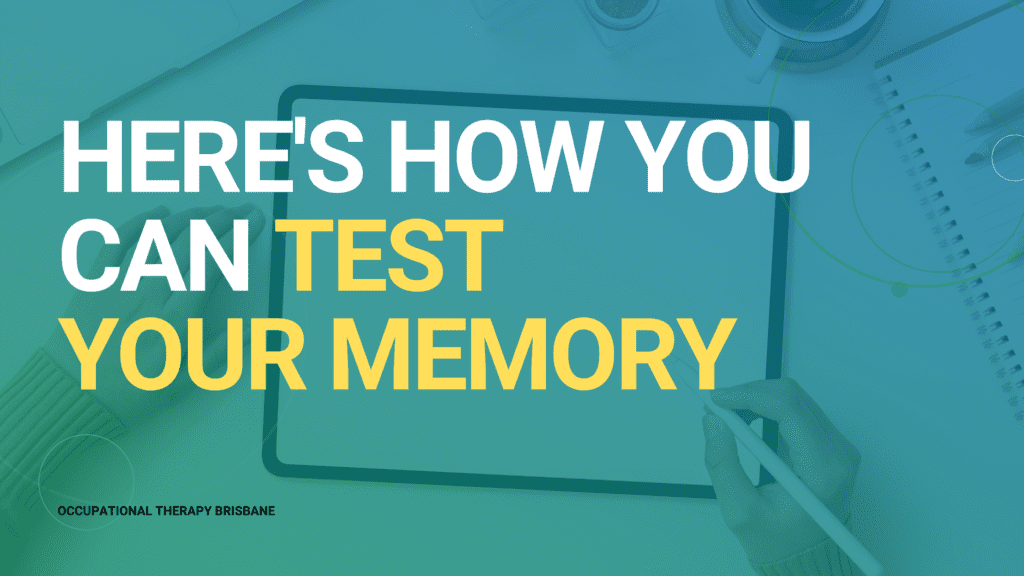
As mentioned earlier your doctor can then perform a physical examination, blood test, and imaging tests to diagnose your condition.
Getting Professional Memory Loss Treatment and Programs
No doubt memory loss can be scary, but it doesn’t have to be.
If you’re experiencing memory problems, don’t hesitate to contact us at our Memory Health Hub where you can arrange a free phone call with our therapist to see if we may be able to help you.
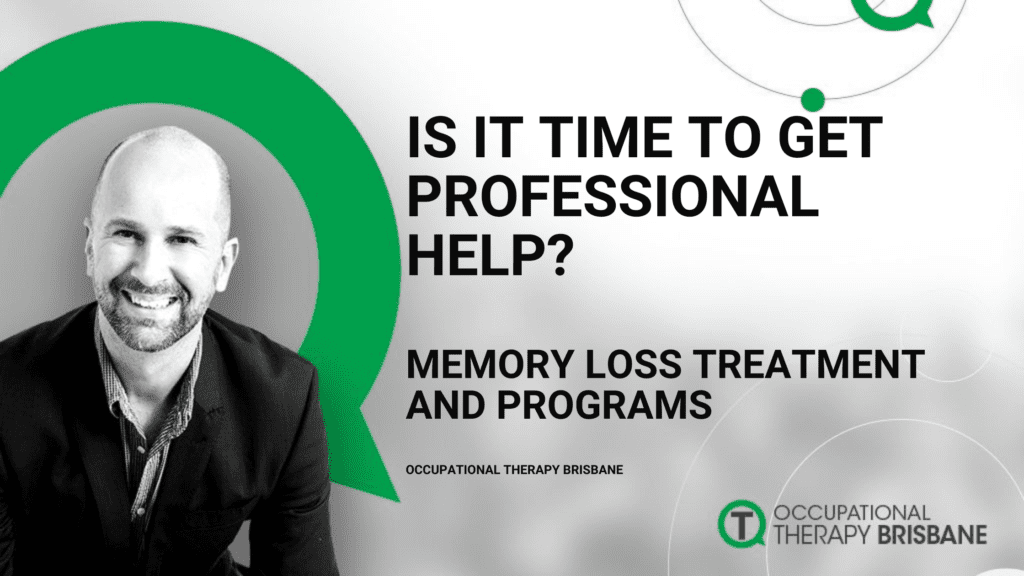
Get the memory loss assessment and support you need so you can live your life better, today.
Online and face to face consultations are available. You can email and request an appointment here or call 1300 783 200 today.



